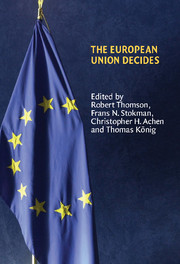Book contents
- Frontmatter
- Contents
- List of figures
- List of tables
- Notes on contributors
- Preface
- 1 Explaining legislative decision-making in the European Union
- 2 Research design: measuring actors' positions, saliences and capabilities
- 3 Testing procedural models of EU legislative decision-making
- 4 Institutional realism and bargaining models
- 5 Compromise, exchange and challenge in the European Union
- 6 Nash versus Schelling? The importance of constraints in legislative bargaining
- 7 A cooperative approach to decision-making in the European Union
- 8 A procedural exchange model of EU legislative politics
- 9 Beyond informal compromise: testing conditional formal procedures of EU decision-making
- 10 Evaluating political decision-making models
- 11 Evidence with insight: what models contribute to EU research
- Appendix I Selection of Commission proposals
- Appendix II Comparison of expert judgements with each other and with information from Council documentation
- References
- Index
- Title in this series
Preface
Published online by Cambridge University Press: 22 September 2009
- Frontmatter
- Contents
- List of figures
- List of tables
- Notes on contributors
- Preface
- 1 Explaining legislative decision-making in the European Union
- 2 Research design: measuring actors' positions, saliences and capabilities
- 3 Testing procedural models of EU legislative decision-making
- 4 Institutional realism and bargaining models
- 5 Compromise, exchange and challenge in the European Union
- 6 Nash versus Schelling? The importance of constraints in legislative bargaining
- 7 A cooperative approach to decision-making in the European Union
- 8 A procedural exchange model of EU legislative politics
- 9 Beyond informal compromise: testing conditional formal procedures of EU decision-making
- 10 Evaluating political decision-making models
- 11 Evidence with insight: what models contribute to EU research
- Appendix I Selection of Commission proposals
- Appendix II Comparison of expert judgements with each other and with information from Council documentation
- References
- Index
- Title in this series
Summary
This book examines legislative decision-making in the European Union. The analyses reported here use some of the most powerful conceptual tools available to social scientists for this task: a range of competing explanations, formalised as models, of decision-making in the European Union. Some of the explanations are grounded in previous research on legislative choice and focus on the impact of formal decision-making procedures on policy outcomes. Others draw inspiration from research on various types of informal bargaining through which actors exert influence. Most of these explanatory models have not yet been tested in the context of EU decision-making. Some have been tested on very limited data sets and in small pilot studies, while others have been developed during the course of this project.
This is not only, or even primarily, a theoretical exercise. The analyses are performed on a large data set, compiled specifically for this study, containing information on 162 controversial issues raised by recent legislative proposals in the European Union. In the following chapters, the explanatory models are presented and illustrated by applying them to examples from this broad selection of controversial issues. They are then applied to all cases in the data set. After comparing the results of these applications, we formulate insights into the processes through which controversies are resolved and decision outcomes are reached in the legislative arena of the European Union. None of the explanatory models has been tested on as large a data set as the one we have collected in this project.
- Type
- Chapter
- Information
- The European Union Decides , pp. xvii - xxPublisher: Cambridge University PressPrint publication year: 2006
- 1
- Cited by

